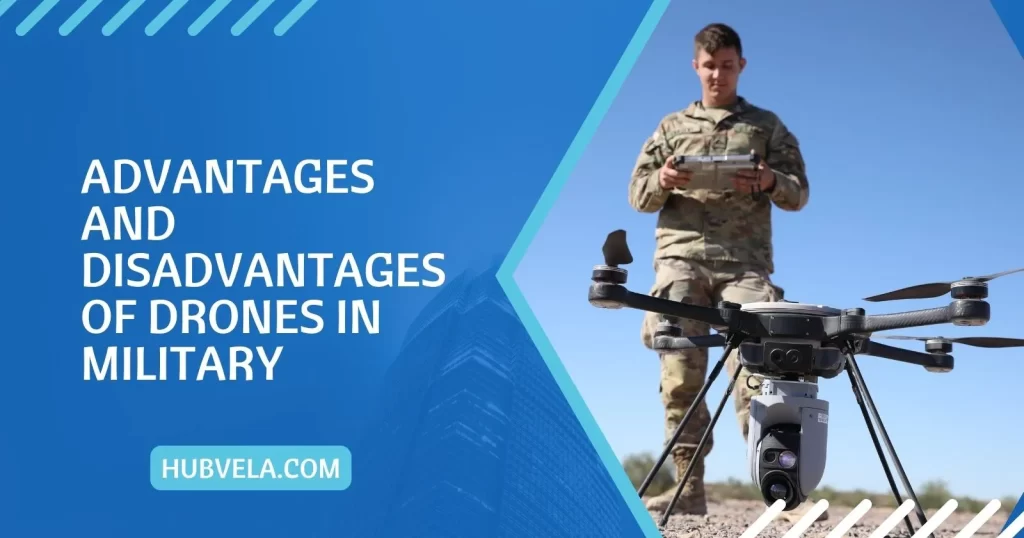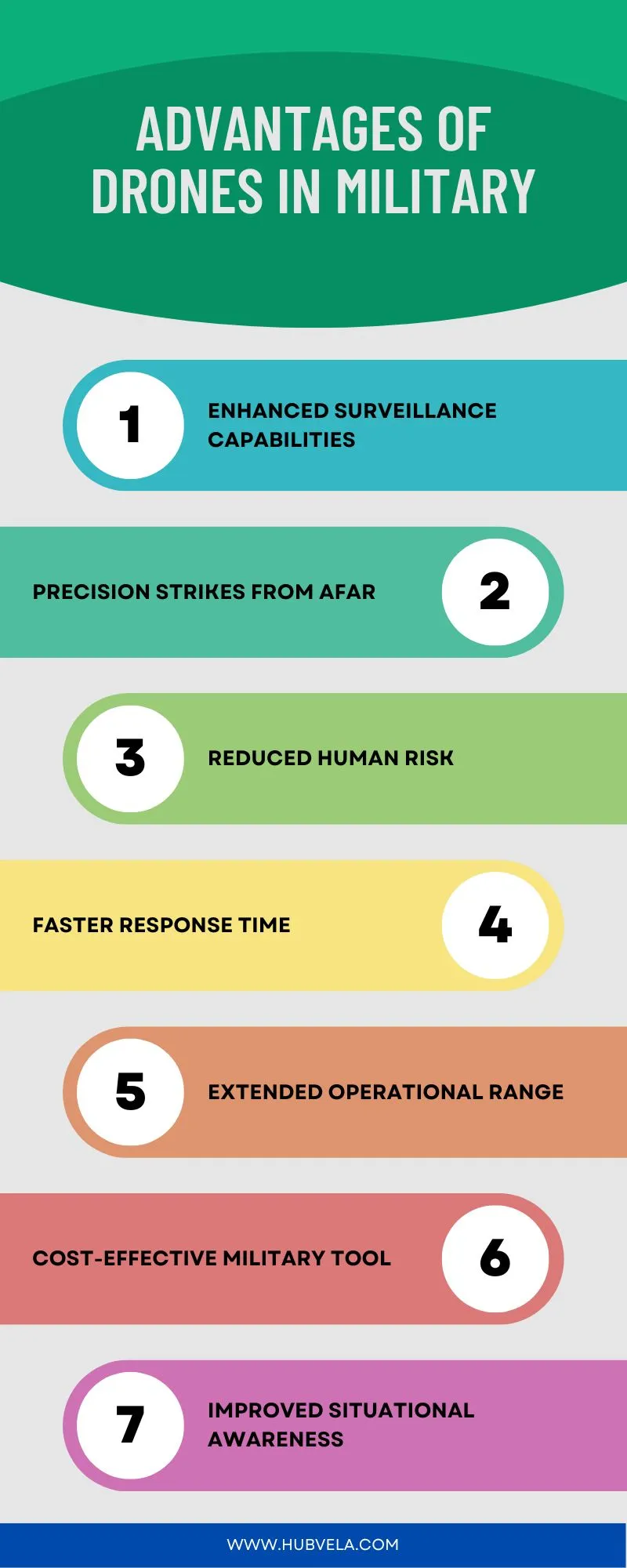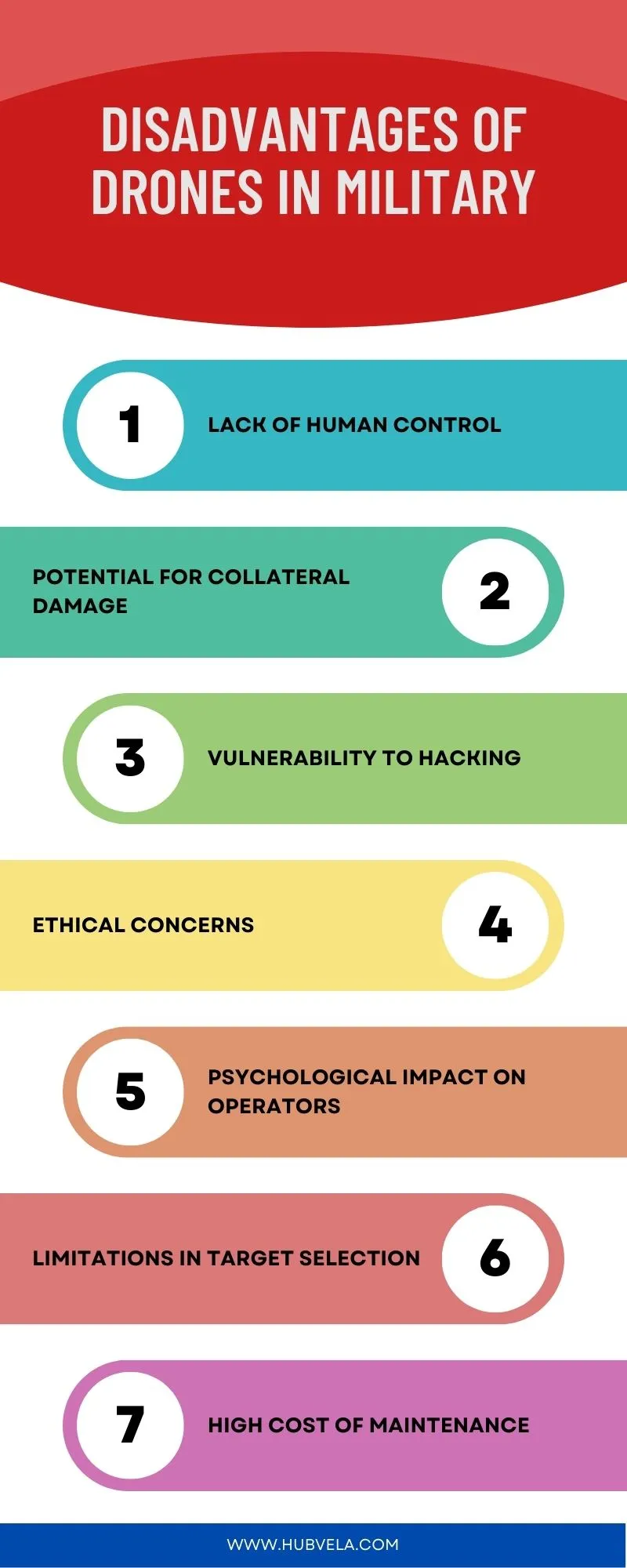Like a double-edged sword, drones have become a prominent tool in modern military operations. Drones offer a range of benefits, from enhanced surveillance capabilities to the ability to execute precision strikes from afar, reducing human risk.
But as with any technological advancement, there are drawbacks as well. Drones may lack the critical decision-making skills of a human operator and have limitations in target selection. Moreover, the high cost of maintenance poses a financial burden.
In this discussion, we will explore both the advantages and disadvantages of drones in military, uncovering the complex tapestry of benefits and challenges they present.

--Advertisement--
Advantages of Drones in Military
Drones have become an increasingly important tool in military operations, offering numerous advantages in various aspects of warfare. Some of the key benefits include:

1. Enhanced Surveillance Capabilities
With their advanced technology and aerial capabilities, military drones provide a significant advantage in terms of enhanced surveillance capabilities. However, this advantage comes with its own set of challenges.
Privacy concerns and legal implications arise due to increased surveillance overreach. Additionally, the impact on civilian populations can’t be ignored.
Moreover, technological limitations, such as limited battery life and range, can hinder the effectiveness of drone surveillance. Balancing these factors is crucial to ensure the responsible and effective use of military drones.
2. Precision Strikes From Afar
One can appreciate the advantages of military drones when it comes to precision strikes from afar. Drones enable remote warfare by allowing operators to target specific locations with utmost accuracy. The ability to conduct precision strikes increases combat effectiveness while minimizing the risk to soldiers’ lives.
Technological advancements in drone capabilities have revolutionized modern warfare, providing strategic implications for military operations worldwide. Drones have proven to be an invaluable asset in achieving military objectives with minimal collateral damage.
3. Reduced Human Risk
Utilizing military drones significantly reduces the risk to human lives in combat situations. By conducting remote operations, soldiers can operate drones from a safe distance, avoiding direct engagement with the enemy. This not only decreases casualties but also enhances operational efficiency, as drones can be deployed quickly and maneuvered with precision.
Moreover, utilizing drones decreases costs associated with training, equipping, and supporting human troops. The expenses involved in training and equipping soldiers are substantial, and by using drones, these costs can be significantly reduced. Additionally, since drones do not require the same level of support as human troops, the logistical burden is also decreased.
However, it’s crucial to address the ethical implications of autonomous drones and ensure they’re used responsibly. The use of autonomous drones raises questions about accountability and the potential for misuse. It’s important to establish clear guidelines and regulations for their use to prevent any unethical behavior or violations of international law. Striking the right balance between utilizing drones for military purposes and maintaining ethical standards is essential for their effective and responsible use.
4. Faster Response Time
By harnessing the speed and agility of military drones, response times in combat can be significantly improved. Drones allow for faster response time, enabling military forces to react swiftly to evolving situations on the battlefield.
With improved reconnaissance capabilities, drones provide real-time information and enhanced target acquisition, allowing for more accurate and efficient decision-making. This not only reduces logistics requirements but also increases operational flexibility, as drones can be deployed quickly and easily to different locations as needed.
5. Extended Operational Range
Drones in the military offer the advantage of an extended operational range. With this capability, their surveillance effectiveness is greatly enhanced, allowing for long distance reconnaissance and strategic intelligence gathering.
6. Cost-Effective Military Tool
With their extended operational range providing real-time information and situational awareness, drones in the military prove to be a cost-effective tool for gathering crucial intelligence and making informed decisions from a safe distance.
The cost effectiveness of drones lies in their ability to minimize the need for human resources and expensive equipment, while maximizing operational efficiency.
Strategic deployment of drones can be achieved due to their mobility and adaptability, aided by technological advancements.
However, ethical implications surrounding the use of drones in warfare must also be considered.
7. Improved Situational Awareness
Maximizing situational awareness, drones in the military provide a comprehensive and real-time understanding of the battlefield. Their tactical deployment allows for quick and efficient response to changing situations.
Drones gather real-time intelligence, enabling commanders to make strategic decisions based on accurate information. Enhanced reconnaissance capabilities allow for detailed analysis of enemy positions and movements.
This improved situational awareness enhances operational effectiveness, giving military forces a significant advantage in the field.
Disadvantages of Drones in Military
Military drones have various advantages, but they also come with significant disadvantages. Some of the key drawbacks of using drones in military operations include

1. Lack of Human Control
The lack of human control over drones in the military poses significant disadvantages. One of the key concerns is the ethical implications of remote warfare, as it distances soldiers from the consequences of their actions. Additionally, automation concerns arise due to the potential for technical glitches or malfunctions.
Without human judgment, there’s also a higher risk of civilian casualties. Furthermore, the lack of human control opens up the potential for misuse, such as unauthorized surveillance or attacks.
2. Potential for Collateral Damage
As we consider the potential for collateral damage, it’s crucial to address the risks and drawbacks that arise from the use of drones in military operations.
One of the main concerns is the possibility of civilian casualties, which can have severe legal implications and negatively impact public perception.
Furthermore, the strategic implications of drone strikes must be carefully evaluated, as they can potentially strain international relations and escalate conflicts.
3. Vulnerability to Hacking
With their increasing reliance on technology and connectivity, drones in the military are vulnerable to hacking, posing a significant disadvantage in modern warfare.
The hacking vulnerability exposes drones to cybersecurity risks, data breaches, and remote control manipulation. Adversaries can exploit these vulnerabilities to gain unauthorized access, compromising mission success and endangering lives.
To mitigate these risks, countermeasures and safeguards, such as robust encryption protocols and regular software updates, must be implemented to protect sensitive data and ensure the integrity of drone operations.
4. Ethical Concerns
While addressing the vulnerabilities to hacking is crucial, it’s also important to consider the ethical concerns associated with the use of drones in military operations.
Privacy concerns arise as drones can collect and record sensitive information, potentially violating individuals’ right to privacy.
Legal implications come into play as the use of drones raises questions about the legality of targeted killings and the extent of governmental authority.
International implications arise due to the potential violation of sovereignty and the impact on diplomatic relations.
Moral implications involve the ethical dilemma of remote warfare and the dehumanization of combat.
Accountability issues arise as the use of drones can make it difficult to hold individuals responsible for their actions.
5. Psychological Impact on Operators
The psychological impact on operators is a significant disadvantage of using drones in military operations.
The remote nature of drone warfare can have detrimental effects on the mental health of operators. Constant exposure to violence and death through the drone’s cameras can lead to desensitization, causing operators to become emotionally detached from the consequences of their actions.
This desensitization, coupled with the moral distress of making life-or-death decisions from a remote location, can contribute to operator burnout and long-term psychological issues.
6. Limitations in Target Selection
Target selection in drone warfare poses significant limitations and challenges for military operations. One of the main concerns is target identification, as drones may struggle to differentiate between combatants and civilians, leading to potential civilian casualties. This raises legal implications and ethical dilemmas for military decision-makers.
Additionally, the use of autonomous decision-making algorithms in drones can further complicate target selection, potentially violating international regulations. Balancing precision and minimizing collateral damage remains a complex issue in the use of drones in military operations.
7. High Cost of Maintenance
As military decision-makers grapple with the ethical and legal implications of target selection in drone warfare, another significant concern arises: the high cost of maintenance associated with these unmanned aerial vehicles.
The cost-effective use of drones requires careful budget allocation for equipment maintenance to ensure long-term sustainability.
Effective resource management becomes crucial to overcome the financial challenges posed by the continuous need for maintenance and repair.
Finding ways to reduce these costs while maintaining operational readiness will be essential for maximizing the benefits of using drones in military operations.
Conclusion on Advantages and Disadvantages of Drones in Military
In weighing the pros and cons of employing drones in military operations, it becomes clear that their advantages outweigh their disadvantages.
Drones offer numerous advantages such as increased surveillance capabilities, reduced risk to human lives, and enhanced precision in targeting enemy forces.
However, there are also some disadvantages to consider, including ethical concerns surrounding the use of lethal force, the potential psychological impact on drone operators, and the vulnerability to hacking, which could compromise sensitive information and missions.
Despite these drawbacks, the benefits of drones in military operations can’t be overlooked.


